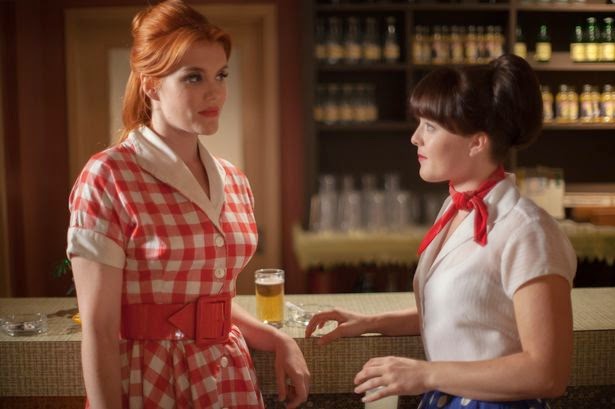As I prepared to watch the series finale of
Call the Midwife yesterday I already expected something bad to happen to the lesbian couple. A couple of months ago I doubt I would've been so pessimistic, but since then we've had a pregnant lesbian mown down by a car the day after her wedding in
Last Tango in Halifax so I've been watching
Call the Midwife with a deep sense of foreboding. It turned out to be justified, since Delia Busby was knocked off a bike just as she was preparing to move in with her secret girlfriend Patsy Mount. Delia woke up in hospital with amnesia and is going back to Wales with her mum to recover. Is there something in the guidance for Sunday night BBC television that insists lesbians have to be killed or maimed by the end of a series? It's certainly not a phenomenon contained to the BBC though, or British television. Sure, there are some exceptions but, examined in context, these two storylines are particularly frustrating.
First, a little lesson from my viewing history. One of the first lesbian storylines I became invested in was from the now-defunct British soap
Family Affairs in 2002. It followed Kelly's love for her married friend Karen and her willingness to become a surrogate mother for her. Long story short - Karen fell in love with Kelly, they were caught out after the baby was born, they tried to make a go of it and, accidentally, Karen's ex pushed Kelly down the stairs. Lesbian storyline ended in the morgue and Karen reconciled with her ex.
Fast forward to 2015. Any suggestion that Kate's death in
Last Tango in Halifax was necessary to propel the narrative and to fix a family rift between Caroline and her mother is a ridiculous defence. It meant that not only did we lose a lesbian (and a black lesbian at that) but the casual homophobia and racism peppered throughout the dialogue was never challenged. At the end of the series, while everyone else celebrated her step-sister's wedding, Caroline sat outside with baby Flora chatting to the ghost of her dead wife while, quite literally, covered in manure.
As for
Call the Midwife... Well, I was prepared for this storyline to progress badly. However, the way I expected it to go was completely in-keeping with the challenges of the era: I thought homophobia and the pressures of a secret relationship would get to Patsy and Delia. That would've been sad, yes, but comprehensible. However, a road accident and amnesia feels just like a deliberate attack on the lesbian characters. The heterosexual couples in this series faced difficulties, yes, but they were based on deeper issues than chance: Shelagh and Patrick Turner had a few ups and down regarding their workloads but came through it as a strong couple; Chummy and Peter lived separately for a while to aid the health of their son but were solid throughout; Fred and Violet overcame shyness and family objections to marry by the end of the series; and Trixie and Tom were drawn apart by differing expectations and her drinking. All very human problems but the lesbian couple? Car crash and amnesia. It doesn't fit, does it?

When you watch the end of a series and your one consolation for the lesbian characters is 'at least you're not dead' then you know there's a pretty serious problem of representation, usually reliant on tropes. These shows were written independently of each other so how do you explain two such disasters in two months?
I suppose
Call the Midwife could salvage this storyline in the next series. I
might be convinced by a continuation where Delia slowly regains her memory and falls in love with Patsy all over again. But is that likely? I don't know. I'll just have to cross everything. In the meantime, the first couple of months of 2015 had been lousy for lesbian representation on popular programmes. Exactly what has changed from 2002?








